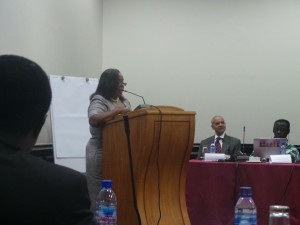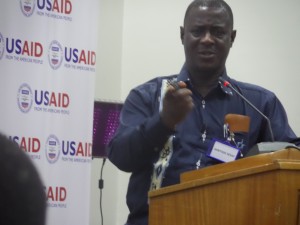Surveillance, Sustainability among Topics Discussed at Spring 2014 END In Africa Partners Meeting
May 29th, 2014

Ghana Health Services Deputy Director General Dr. Gloria Quansah Asare Opens NTD Partners Meeting. Photo: FHI 360
Four years into the USAID-funded, FHI360-managed END in Africa project, which targets five neglected tropical diseases (NTDs)—lymphatic filariasis (LF), schistosomiasis, trachoma, onchocerciasis and soil-transmitted helminthiasis—in the five fast-track West African countries of Burkina Faso, Ghana, Niger, Sierra Leone and Togo, about 50 stakeholders met in the Ghanaian capital city of Accra to review progress and discuss persistent challenges.
Held in Accra, Ghana on April 23–25, 2014, the meeting brought together staff from the USAID NTD program including Coordinator Emily Wainwright, national NTD program managers from the 5 supported countries, representatives from project lead FHI360 and sub grantees Helen Keller International (HKI) and Health and Development International (HDI), officials from the Ghana Health Service (GHS) including the Ghana NTD program and the African Programme for Onchocerciasis Control (APOC), including APOC Director Dr. Jean-Baptiste Roungou.
Participants agreed that the system and structure of the END in Africa project has been successful; and that the project has made very good progress on delivering mass treatment for LF and trachoma in all five countries. However, they noted the need to validate this achievement via a technically sound surveillance process. In addition, they recommended that USAID’s NTD program, END in Africa and other relevant partners within the global NTD community review and discuss country plans for surveillance to identify strengths, potential pitfalls and areas requiring extra support.

Sierra Leone’s NTD Program Manager Dr. Santigie Sesay Discusses Sierra Leon’s Progress in the Fight against NTDs. Photo: FHI 360
As the discussions progressed, stakeholders emphasized the need to initiate high-level discussions, implement activities and/or conduct operational research around several emerging or unresolved challenges, including program sustainability, cross-border collaboration, persistent disease hotspots and morbidity control. They also noted that countries that share borders with END in Africa countries, some of which have weaker NTD programs, will need to be included in the discussions and activities, since elimination of the targeted NTDs is only possible through collaborative efforts.
Concerns were expressed around the topic of program sustainability; and several national NTD coordinators indicated that their programs receive minimal if any support for direct program implementation from their respective ministries of health. As such, they see a need for additional USAID support for their national NTD programs beyond September 2015, when the mandate of the END in Africa project is set to expire. In a similar vein, a recommendation emerged for the USAID NTD Program and other NTD partners within the END in Africa project to advocate with the ministries of health to improve funding for morbidity control as well as general funding for the NTD Programs in the 5 supported countries.
These issues, among others, will be discussed in much greater depth during the FY2015 work planning sessions in each of the five END in Africa countries, set to occur between May 6 – June 13, 2014.

